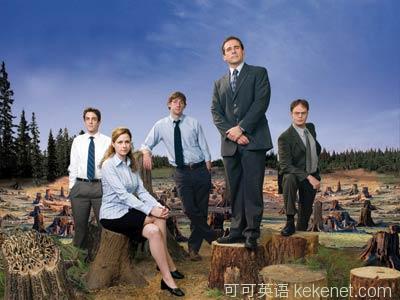(单词翻译:单击)

In the past month we have welcomed many new TV shows of this year’s fall season. Meanwhile, we’re also saying goodbye to others, such as The Office.
上个月,我们迎来了多部今年秋季的新剧集。同时,我们也告别了一些老剧集,例如《办公室》。
The ninth season of the NBC comedy series, which premiered on Sept 20, will be its last. Regardless of how you’ve treated the series after its leading actor Steve Carell left the show, The Office will always hold a special place in our TV-loving hearts. It seamlessly and hilariously wrapped us around the daily lives of the office employees in Pennsylvania, and provided us with a vivid and memorable embodiment of today’s office culture.
这部NBC(美国全国广播公司)剧集的第九季于9月20日上映,本季也将是该剧的完结季。无论在主演史蒂夫•卡瑞尔离开后,你如何看待该剧,《办公室》都将一直在我们这些剧迷心中占据特殊地位。它不仅真实、幽默地表现了一群来自宾夕法尼亚州的办公室职员的日常生活,还生动地为我们展现了令人印象深刻的当代办公室文化。
There are several TV series like The Office, which tell of the happenings in an office environment. From casual sexism to office boors, let’s take a look at the unique insights they offer into how the world of work in the US and the UK has changed over the past 50 years.
类似《办公室》一样讲述职场故事的剧集不在少数。从日常的性别歧视到“职场老粗”,让我们一起跟随这些剧集的独特视角来看看过去半个世纪英美职场的变迁。
1960s: Mad Men (US, 2007-present)
20世纪60年代:《广告狂人》(美国,2007至今)
In the offices of the Sterling Cooper ad agency in New York, wandering hands of working men frequently emerge from the smoky fog for a lucky strike, usually at the nearby secretaries wearing tight dresses.
在纽约Sterling Cooper广告公司的办公室里,男职员常常会在烟雾缭绕中漫不经心地伸手索要一根好彩牌香烟,而这一幕通常在穿着紧身衣的秘书身边上演。
Women organize the men’s diaries and provide a nice view, but few have any opinions of their own. Peggy Olson is the exception. She is only accepted as one of the boys after those men figure out that they don’t want to date her.
女士们安排男士们的工作日程,是办公室中的靓丽一景,但却很少有自己的独到见解。而佩吉•奥尔森却是个例外。在成为最不受男士欢迎的约会人选之后,她成为别人眼中的男人婆。
And then there is alcohol. At any hour of the day you can find a high-flying executive indulging in a drink, puffing cigars and staring at his personal assistant’s chest. Nobody even bats an eyelid.
酒精也不得不提。每时每刻,你都可以看到野心勃勃的主管一边沉醉于杯中物,口中衔着雪茄,一边盯着助理的胸部。甚至没人对此大惊小怪。
1970s: Life on Mars (UK, 2006-2007)
20世纪70年代:《火星生活》(英国,2006年至2007年)
Detective Gene Hunt not only has a wildly sexist disregard for the emerging feminist movement, but is a bully to boot.
探长基恩•亨特不仅是一个粗暴的男性至上主义者,对日渐兴起的女权运动漠视,更是一个欺凌弱小的人。
The character is the typical boss figure of the 1970s: working-class, with a bottle of cheap scotch in his filing cabinet and a bad attitude.
这一角色是上世纪70年代典型的老板形象:工人阶级,态度恶劣,文件柜里总是摆着一瓶廉价威士忌。
Women are referred to as “skirts” and lower-ranking officers are there to be kicked and browbeaten.
他将女性称为“短裙”,对下级警官威逼恐吓且拳脚相加。
1980s: Terry and June (UK, 1979-1987)
20世纪80年代:《特里和琼》(英国,1979至1987)
Driven by greed, the 1980s office is a place of crazy aspiration in which junior managers constantly compare their wealth to that of their bosses.
上世纪80年代,人们受到贪婪的驱使,办公室成为欲望疯狂滋生的温床。在这里,初级管理者们不停地和自己的老板攀比财富。
Terry and June’s stifling urban setting is filled with toady underlings who enjoy sucking up to their arrogant bosses.
《特鲁和琼》的故事背景被设置在一座沉闷的城市中,这里充斥着谄媚的下属,不断去讨好傲慢无理的老板们。
Membership in the golf club is highly coveted back then and employees invite their chief executives over for joyless, tense dinners, cigars and brandy in a desperate attempt to impress them.
那时人们极度渴望称为高尔夫俱乐部的会员。员工邀请老板参加气氛紧张的无趣晚宴,并奉上雪茄、白兰地,不顾一切地想要给老板留下好印象。
1990s: This Life (UK, 1996-1997)
20世纪90年代:《人生》(英国,1996年至1997年)
Women begin to show their power in the 1990s–as far as TV is concerned anyway.
上世纪90年代,女性开始展示自己的实力——至少在电视剧中是这样的。
Anna Forbes, the hardheaded barrister in This Life typifies the successful 1990s working woman. She not only has to behave like a man to get on, but has to do it all wearing high heels and short skirts.
安娜•福布斯在剧中是位精明的大律师,这一角色堪称90年代成功职业女性的典范。她不仅要像男性一样做事,同时还要全程穿着高跟鞋和短裙。
Furthermore, Forbes cannot aspire to a happy relationship or motherhood because she is too busy getting drunk and losing all self-respect in a series of one-night stands. The message for women in the 1990s is very much clear: choose, because you can’t have it all.
另外,福布斯无法奢望一段幸福的恋情,也无法称为一名合格的母亲,因为她总是烂醉如泥,在一系列的一夜情中丧失自尊。上世纪90年代女性身上所传达出的讯息十分清晰:要做出选择,因为你无法拥有一切。
2000s: The Office (US, 2005-present)
21世纪:《办公室》(美国,2005至今)
Inspired by the British sitcom TV series The Office (2001-2003), the character Michael Scott came dancing on to US screens. He spouts his meaningless management-speak and tries hard to appear as if he is promoting equality and fair treatment for all. Scott isn’t so much the boss of Dunder Mifflin Paper Company, but a “chilled-out entertainer” falling over himself to be friends with his employees.
这部剧集改编自英国同名情景喜剧的《办公室》(2001年至2003年),麦克•斯科特这一角色来到了美国荧屏上。他滔滔不绝地讲述那些无用的管理学理论,努力表现出一副致力于维护所有员工待遇公正平等的样子。相对于Dunder Mifflin纸张公司老板的这一身份,斯科特更像是位“淡定的表演者”,不断放低身段,想同员工打成一片。
The Office shines a light on everything that stinks about the modern workplace: the overzealous enforcement of health and safety rules, and the torturing team-building courses favored by some employers to motivate their badly dressed and uninspired employees.
《办公室》突出了现代职场一切令人深恶痛绝的事情:强制实行的健康安全规定和折磨人的团队建设课程,这些深受老板们青睐,用来激励那些不修边幅、毫无生气的员工。


